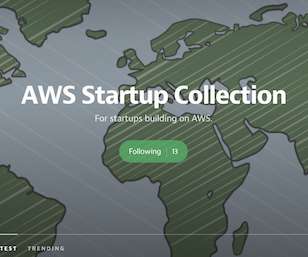Grouping related classes in your markup
CSS Wizardry
MAY 21, 2014
An interesting way of visually and ‘physically’ grouping multiple class attributes

CSS Wizardry
MAY 21, 2014
An interesting way of visually and ‘physically’ grouping multiple class attributes

All Things Distributed
MAY 14, 2014
I’m excited to announce a new blog dedicated to AWS startups. We’re launching it on Medium, itself a startup on AWS. I kicked off the blog with a Q&A with the Medium CTO Don Neufeld. I really enjoyed Don’s answers to my questions and there are some real gems in here for startup CTOs.
This site is protected by reCAPTCHA and the Google Privacy Policy and Terms of Service apply.

Tim Kadlec
MAY 21, 2014
It seems like the idea of performance budgeting has been gaining quite a bit of traction over the past year. This is awesome! The best way to improve web performance is to prioritize it from the get-go, and that’s exactly what a performance budget helps you do. But having the budget set in a document somewhere doesn’t accomplish much. It needs to be enforced to really matter.

The Polyglot Developer
MAY 16, 2014
With the intention of writing a tutorial, I’ve gone ahead and created a Flappy Bird clone in Unity3D and named it Floppy Clone. The source code and all assets to this project can be found on GitHub. The post Floppy Clone Released appeared first on The Polyglot Developer.

The Agile Manager
MAY 30, 2014
Technical debt is a useful metaphor for explaining why some code is faster to complete but more expensive to maintain. It is also helpful in explaining design decisions made for sake of expediency, or because of an outright lack of knowledge. Tech debt can be a real burden on development, particularly as it takes away time that would otherwise be directed toward productive investment in new feature development.

Speed Curve
MAY 31, 2014
As of the 1st of June SpeedCurve has switched to using faster testing agents at Amazon EC2 data centers. As web pages become more Javascript and resource heavy I've noticed more and more pages max out the CPU while performance testing. SpeedCurve now uses EC2 m1.medium instances which have 3.75GB of RAM with faster CPU and network performance. For CPU heavy pages you should see a drop in overall load time.
Technology Performance Pulse brings together the best content for technology performance professionals from the widest variety of industry thought leaders.

ScaleOut Software
MAY 15, 2014
We have spent a great deal of time at ScaleOut Software re-architecting our in-memory data grid (IMDG)’s code base to make best use of many cores and large memory. For example, the IMDG must be able to efficiently create millions of objects in each server to make use of its huge storage capacity. Likewise, object access paths must be heavily multi-threaded and avoid lock contention to minimize access latency and maximize throughput.

The Polyglot Developer
MAY 14, 2014
When creating a game there is often the need to create a toggle. An obvious example might be for a volume controller. Click the sprite to turn the volume on, and click the same sprite to turn the volume off. The best way to accomplish this task is to create a sprite game object that has a script with two public sprite variables. In the Unity editor add one sprite that will represent the on toggle position and another sprite that will represent the off toggle position.

Tim Kadlec
MAY 12, 2014
At long last, it appears we have our much-needed markup solution for responsive images thanks to srcset, sizes and picture. Implementation is already happening in Chrome & Opera (Blink) and Firefox (Gecko). Soon, the Blink implementation will be ported to WebKit. This is fantastic news—we’ve needed this for so long! Yet some are still not happy.

Speed Curve
MAY 27, 2014
Speed Index is now available on SpeedCurve. Choose "SpeedIndex" from the top right of the main graphs. Speed Index is an important measure of a user's experience as the page loads. It's based on video analysis of how the page loads over time. Here's a great video from Paul Irish introducing Speed Index at the recent Front End Ops Conference.

The Polyglot Developer
MAY 5, 2014
It has been exactly seven days since Turbo Prop for Android, iOS, Windows Phone, BlackBerry, and Amazon Kindle Fire went live. This is a status update in regards to downloads as well as ad earnings for my first Unity3D game. The post Seven Day Turbo Prop Stats appeared first on The Polyglot Developer.

The Polyglot Developer
MAY 4, 2014
Monetization is desired by game developers and standard app developers alike. For the developers that would like to keep their work free to download, in app advertising is often a good choice. Admob by Google is convenient for ads because it is compatible with iOS and Android without changes to the Unity3D project. The post Google Admob with Unity3D appeared first on The Polyglot Developer.

The Polyglot Developer
MAY 3, 2014
When it comes to computing, not all devices are created equal. An action intense game that runs at 500 frames per second on a computer may only run at 12 frames per second on a mobile device. To maximize your frame rate across all platforms it is very important to use your game resources efficiently. One of the best things you can do for your game is to use object pooling.

ScaleOut Software
MAY 4, 2014
A recent blog post highlighted a Microsoft technical report which asserts that most Hadoop workloads are 100 GB or smaller, and for almost all workloads except the very largest “a single ‘scale-up’ server can process each of these jobs and do as well or better than a cluster in terms of performance, cost, power, and server density.” It’s certainly true that Hadoop MapReduce seems to have focused more on clustering issues than on single-server optimizations.

All Things Distributed
MAY 15, 2014
'This is an extended version of an article that appeared in the Guardian today. We are rapidly entering into an era where massive computing power, digital storage and global network connections can be deployed by anyone as quickly and easily as turning on the lights. This is the promise – and the reality – of cloud computing which is driving tremendous change in the technology industry and transforming how we do business in Europe and around the world.
Let's personalize your content